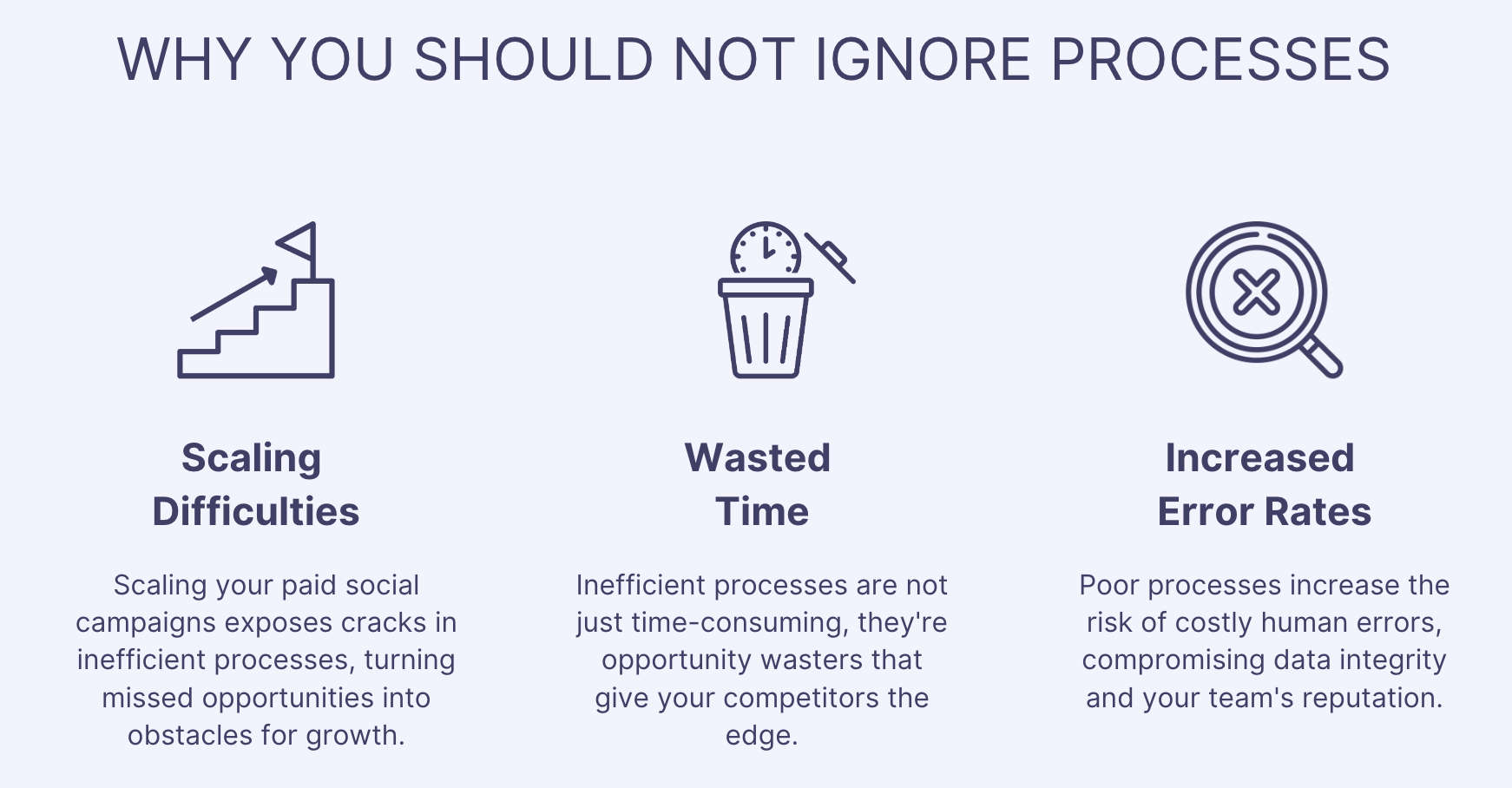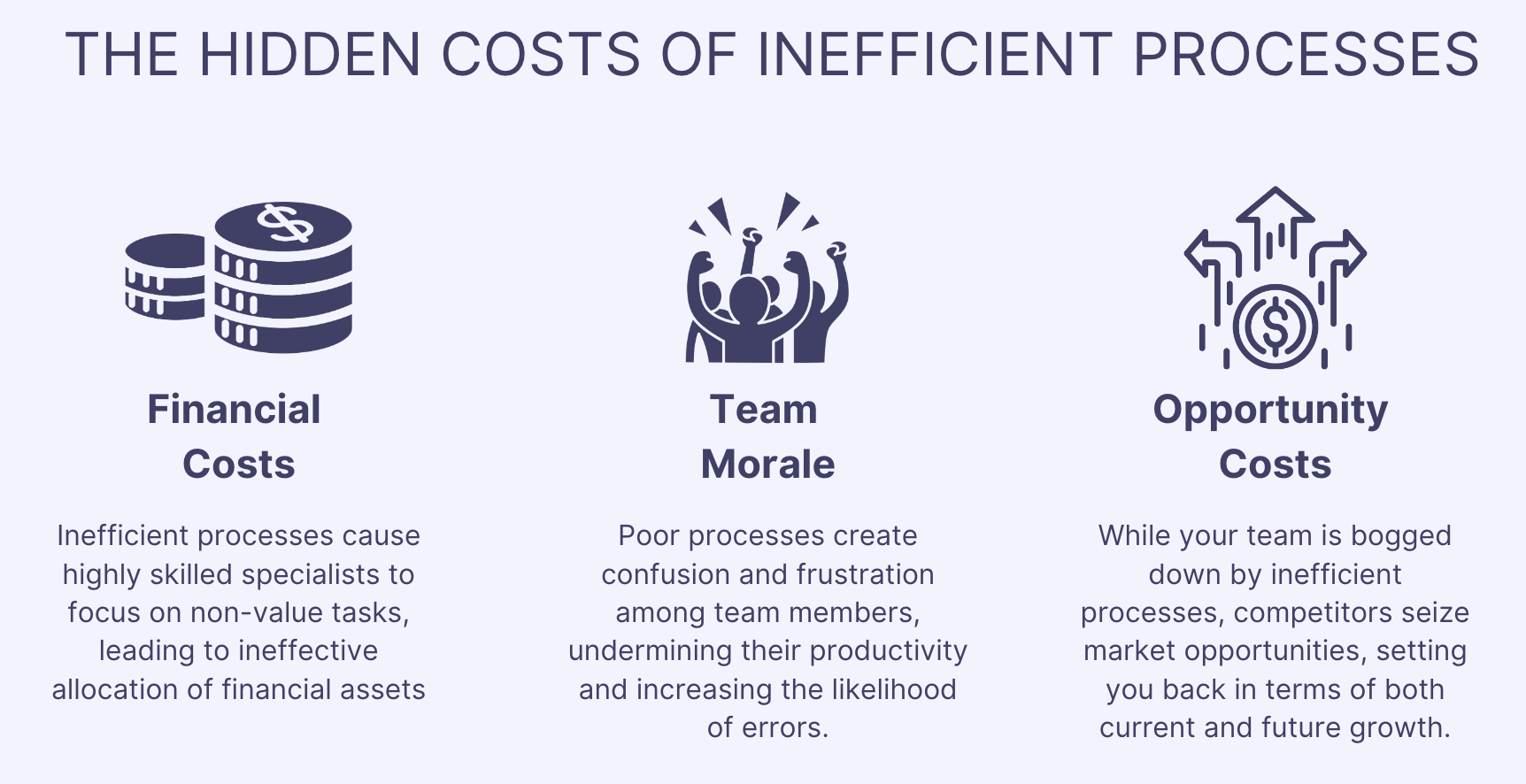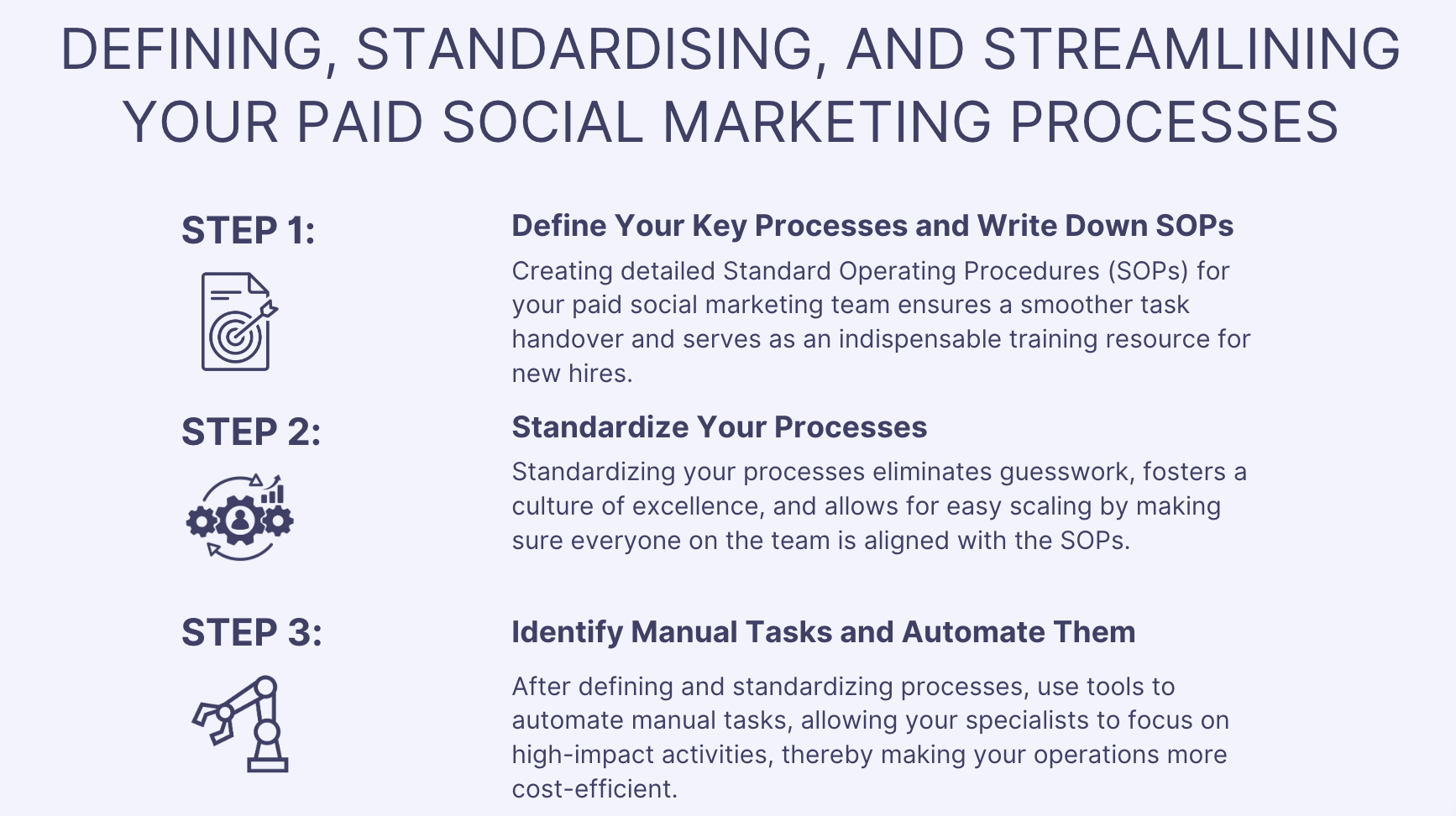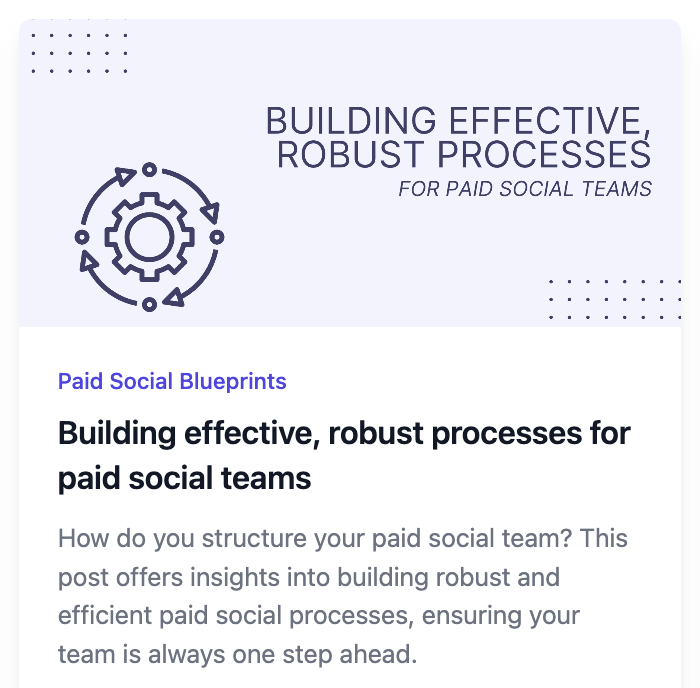Paid Social Blueprints
Why you should care about processes as a paid social marketer
Efficient processes can help you drive your KPIs, boost your team's productivity, and improve profitability. Dive into our in-depth guide to understand why you can't afford to ignore them and how to start building efficient processes.
Introduction
You might think that as a marketer, your primary concerns should revolve around ROI. While it’s undeniably important, there's another aspect that often gets overlooked but can make or break your ad performance: processes.
Running a complex paid social team includes joggling multiple variables — budgets, creatives, metrics. Now, think about how you manage all these elements. Are you manually pulling data into spreadsheets, uploading ads into Meta or TikTok? These are all part of your operational processes, and their efficiency can dramatically affect the success of your campaigns.
The inconvenient truth is that sticking to inefficient operations can cost you more than you might realize. Time spent on thinking how to approach tasks is time taken away from strategic planning, testing new creatives, and driving innovation. And it's not just about time.
Bad processes can be like sand in the gears, decreasing your team's productivity in half and cutting the energy that could be better directed towards more strategic tasks. Moreover, inefficient processes can be expensive, eating away at your budget without providing a commensurate return on investment.
So, why should you, as a marketer, care about processes? Because they are the backbone of your operations. The quality of your processes can determine how well your marketing machine runs. In this blog post, we're going to delve into the critical importance of optimizing processes and why they deserve more of your attention.
Why You Should Not Ignore Processes
While your media buying strategy and creative ideation are vital, ignoring processes can lead to multiple setbacks. Here's why processes should be on your radar as much as your KPIs and ROI.

Scaling Difficulties
In the early stages of a paid social marketing, you might manage to get by with not optimal processes. The real problems emerge when you try to scale. As your campaigns grow in complexity—more channels, more creative testing, bigger budgets—the cracks in your processes start to show. Each new layer adds a level of complexity that your existing processes may not be equipped to handle.
Ignoring the need for robust processes as you scale can become an obstacle. You'll find yourself in a cycle of firefighting, always a step behind the evolving needs of your campaigns. This reactive approach can cost you valuable time, prevent you from seizing new opportunities, and ultimately damage your growth trajectory.
Wasted Time
Time is a limited resource, and in the fast-paced world of paid social marketing, every second counts. When your processes are inefficient, you're essentially throwing time out the window. Manually entering data into spreadsheets, waiting on email approvals, or chasing down team members for updates are all examples of how poor processes can waste time.
This isn't just about the minutes ticking away on a clock, but about the opportunity cost. While you're drowning in manual tasks and inefficiencies, your competitors are optimizing their processes and capturing market share. The time you save by fine-tuning your processes can be redirected towards creative and strategic initiatives that make a real impact on your success.
Increased Error Rates
Human error is unavoidable, moreover, it's part of being human. However, inefficient or absent processes amplify the risk of mistakes happening. When your team is juggling multiple tasks due to poor processes, the odds of missing a critical detail or making a data entry error increase substantially. And it's not just minor error - imagine your media buyer accidentally adding an extra 0 to your bid while rushing to create multiple campaigns.
The possibility of increased error rates go beyond immediate damages. They can compromise the integrity of your data, skew your analysis, and lead to poor decision-making. Over time, constant mistakes can also affect your team's reputation, as customers and stakeholders expect a certain level of professionalism and reliability. Ignoring the need for streamlined processes adds an unnecessary layer of risk that can be mitigated by giving processes the attention they deserve.
By giving due attention to processes, you're investing in a safety net that guards against common pitfalls in your paid social marketing. Whether you're aiming to scale effectively, save time, or minimize errors, robust processes are your weapon for sustained success.
The Hidden Costs of Inefficient Processes
While we've discussed the visible consequences of neglecting processes, there are hidden costs that can silently affect your marketing budget, team morale, and potential opportunities. Understanding these hidden costs is essential to fully grasp why streamlined processes should be an integral part of your marketing strategy.

Financial Costs
It's not uncommon to hire highly skilled specialists with the intention of having them focus on strategy and high-level tasks. However, if you're operating within inefficient processes, you'll find these experts spending their time on firefighting rather than what they were actually hired for. When you factor in their high salaries, this equates to an ineffective allocation of your financial resources.
Let's put it this way: you're paying your specialized staff the same hourly rate whether they're manually uploading ad creatives to various ad managers or whether they're deeply involved in developing a holiday season media buying strategy. Every hour spent on manual tasks is an hour not spent on valuable strategic work. You hired your experts for their specialized skills and insights, so it's in your best financial interest to ensure they spend more of their time on activities that deliver the most value.
The reality is, poor processes are financially unsustainable in the long run. Whether it's in missed revenue opportunities or increased operational costs, inefficient processes take a financial toll that can bring down your campaigns’ profitability.
Team Morale
Inefficiency doesn't just hurt your bottom line; it also affects your team's morale. When processes are unclear or ineffective, your team members struggle to contribute to their full potential. The lack of clarity leads to confusion, duplicated efforts, and frustration—ultimately impacting the overall performance and well-being of your team.
A demoralized team is less productive and more prone to errors, creating a vicious cycle that further deteriorates process efficiency. Optimized processes not only improve workflow but also empower your team members, boosting their morale and their ability to contribute meaningfully to the company's goals.
Opportunity Costs
If we look beyond the immediate financial losses and team morale, we'll find the hidden opportunity costs that are sometimes hard to quantify but are incredibly impactful. The time your team spends figuring out how to request new creatives is time not spent on market research, creative brainstorming, or strategy optimisation.
While you deal with inefficiencies, your competitors move ahead, capitalising on market opportunities and refining their strategies. Therefore, the real cost of inefficient processes is not just what you're spending now but what you're losing in terms of future growth and success.
By taking a holistic view that includes both visible and hidden costs, it becomes clear why processes are a the core of your success in paid social marketing. They are not just operational necessities but strategic imperatives that directly influence your financial health, team morale, and growth opportunities. In a competitive landscape, a focus on efficient processes isn't just a good-to-have, it's a must-have.
Defining, Standardising, and Streamlining Your Paid Social Marketing Processes
Recognizing the importance of solid processes is just the starting point. The next step is building those processes (we have a blog post about it!) into the framework of your paid social marketing efforts. Think of this as laying the foundation for a house - a strong foundation ensures that everything that comes after is more stable and reliable. Here's how you can go about it.

Step 1: Define Your Key Processes and Write Down SOPs
Begin by detailing out the primary processes that guide your paid social marketing team. This involves everything from creative concept development to data analysis. Creating Standard Operating Procedures (SOPs) is an essential next step. These SOPs serve as the rulebook, detailing each step in your process. They eliminate guesswork and allow for a more seamless handover of tasks within the team and other internal or external stakeholders.
Not only do SOPs help your current team members, but they are also invaluable resources for training new hires. They serve as a training manual that new staff can refer to, ensuring they get up to speed as quickly as possible, reducing the learning curve time and making your operations more agile.

Step 2: Standardize Your Processes
Standardization ensures that everyone on the team knows exactly what to do and how to do it. Uniformity in processes eliminates guesswork, thereby reducing errors. Make sure that everyone has access to the SOPs and is trained to follow them. Regularly review and update these documents to reflect any changes or optimizations.
A unified process is more than just a set of instructions, it's a cultural trait. By ensuring that every team member, from your newest hire to your most seasoned expert, is on the same page, you foster a culture of excellence and accountability. This also makes it far easier to integrate new members into the team, ensuring that your operation can scale smoothly.
Step 3: Identify Manual Tasks and Automate Them
Even the best processes can be loaded by manual tasks that eats into your team's time. After your processes are mapped and standardized, review them to identify tasks that are candidates for automation. Tools like Kitchn.io can step in at this stage to help you get rid of manual non-value ad operations, allowing your highly-skilled specialists to focus on tasks that require their expertise.
The financial benefits of automation (you learn more from the linked blog post) are clear. Your specialists cost the same whether they're manually uploading ad creatives or working on a high-level strategy for the holiday season. By automating repetitive tasks, you free up their time to focus on the latter, which is where their skills can truly make a difference. You're not just saving time - you're reallocating resources to where they have the most impact.
By taking the time to define, standardize, and streamline, your team becomes more agile, your operations more cost-efficient, and your campaigns more effective. It's a win-win situation for everyone involved.
Conclusion
In the fiercely competitive world of paid social marketing, the smallest edge can make the biggest difference. Processes might not be the glamorous part of marketing, but as we've laid out, they're the core of your campaigns’ performance, team morale, and financial health. Ignoring them comes at a high cost—be it financial, time, or missed opportunities. On the other hand, putting in the effort to define, standardise, and automate your processes opens up a whole new realm of possibilities.
Streamlining your operational processes is not just an administrative chore; it's a strategic imperative. It allows your specialised staff to truly shine in their roles. In an industry where everyone is trying to outperform one another, efficient processes are your secret weapon. Make them a core of your paid social marketing strategy, and you'll be setting the stage for long-term, sustainable growth.
Next Read
Paid Social Blueprints
Introducing CPAC: the hidden metric every paid social marketer needs to know
Paid Social Blueprints
Building effective, robust processes for paid social teams
Paid Social Blueprints


